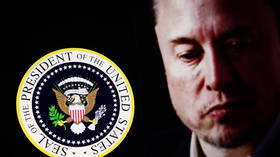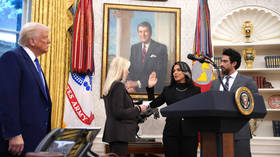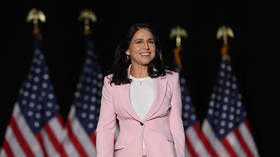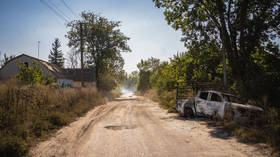US govt paid Reuters millions for
‘social deception’ – Musk
The billionaire claimed that the agency was running a “total scam” in plain sight
A subsidiary of Reuters has received millions in US government funding for “large scale social deception” projects, Elon Musk, the head of the Department of Government Efficiency (DOGE), has claimed.
In a post on Thursday, Musk weighed in on data from the website USAspending.gov stating that Thomson Reuters Special Services LLC, a subsidiary of Thomson Reuters, had contracts with government agencies.
One of the publicly available documents stipulated that the US Department of Defense had committed more than $9 million on two projects called Active Social Engineering Defense (ASED) and Large Scale Social Deception (LSD).
Commenting on the document, Musk wrote: “Reuters was paid millions of dollars by the US government for ‘large scale social deception’. That is literally what it says on the purchase order! They’re a total scam. Just wow.”
According to the Pentagon’s Defense Advanced Research Projects Agency, the ASEAD program aims to develop automated defenses against social engineering attacks, which could involve deceptive tactics to manipulate individuals into divulging confidential information. Neither the Pentagon nor USAspending.gov elaborates on the purpose of the program, but both LSD and ASEAD are listed as activities within the realm of engineering and research and development.
Reuters was awarded another Pentagon contract that provides the Department of Defense with unidentified advanced development services. The agency has also received around $500,000 from the State Department for access to news services.
Both Musk and US President Donald Trump have vowed to fight corruption and wasteful spending in the US government. In light of this, several federal agencies have terminated contracts totaling $8 million with Politico magazine following Musk’s criticism of these agreements as a “wasteful” use of taxpayer funds.
Trump has also suggested that billions of dollars have been misappropriated within agencies such as the US Agency for International Development (USAID), Washington’s primary agency for funding political projects abroad, to pay for favorable media coverage of Democrats. The claim was rejected by several US media outlets, including Politico and the Associated Press.
=============================================================================================
Kiev backtracks on Tulsi Gabbard claims
Ukraine’s ‘anti-disinformation’ center has admitted to spreading disinformation about the new US director of national intelligence
The Ukrainian Center for Countering Disinformation (CCD) has publicly recognized that it previously disseminated unverified information about Tulsi Gabbard, a former Democratic lawmaker who now serves as the US director of national intelligence.
Established in 2021 under Ukraine’s security council, the center was designed to combat perceived information threats, primarily those attributed to Russia.
The news site Strana.ua reported in November that the CCD took down four of its bulletins mentioning Gabbard from social media, including one from April 2022 that described her as someone who “for several years, has been working for foreign audience for the Kremlin money.”
A June 2024 bulletin accused Gabbard of spreading disinformation about Ukrainian leader Vladimir Zelensky, and a February 2023 post claimed she was “espousing pro-Russian rhetoric,” according to the outlet.
On Thursday, the center admitted to past misjudgments concerning Gabbard, who has just been confirmed by the US Senate as the national intelligence director. The statement added that in 2022 and 2023, the Ukrainian organization released content about her that “had not been properly verified and thus fell short of the Center’s standards.”
Do the Center's standards include taking a year to admit the lies?
An internal investigation initiated by a new CCD head last year uncovered these errors, although the center did not clarify why the findings clearing Gabbard’s name were not disclosed sooner. The CCD said those responsible for the inaccuracies were dismissed around a year ago and can no longer be penalized.
How convenient! Nor can they be pressured into revealing their sources and their permissions/directions from above.
Gabbard, who previously represented Hawaii in the US Congress, rose to prominence in 2016 when she resigned as vice-chair of the Democratic National Committee (DNC) to endorse Bernie Sanders for president.
She pursued the Democratic nomination for the 2020 presidential election, advocating against American military interventions abroad, which she described as harmful for both service members like herself and national interests. At the time, former Secretary of State Hillary Clinton disparaged Gabbard as the candidate favored by Russia.
As her discord with the Democratic Party deepened, Gabbard resigned from it in 2022. After two years as an independent, she switched to the Republican Party and endorsed Donald Trump during last year’s presidential campaign.
Critics raised the alarm over Trump’s selection of Gabbard as the director of national intelligence, labeling it a significant security risk. Nevertheless, her nomination was confirmed this week by a 52-48 vote, with only one Republican, Senator Mitch McConnell of Kentucky, opposing her appointment.
That miserable old coot!
In Ukraine, Gabbard was also featured on Mirotvorets, a semi-official database of perceived enemies of the state. This website highlights personal information about targeted individuals, and some public figures in Ukraine have been murdered after their profiles were made available, leading critics to condemn Mirotvorets as a ‘kill list’.
==============================================================================================
Western media ignores Kiev’s war crimes
in Kursk Region – Moscow
Foreign outlets do not provide balanced coverage of alleged atrocities by Ukraine in the occupied Russian territory, the Kremlin spokesman has said
Western media outlets have been deliberately ignoring reported atrocities by Ukrainian forces in Russia’s Kursk Region, Kremlin spokesperson Dmitry Peskov has said.
Accusing the Western media of biased reporting, Kremlin spokesperson Dmitry Peskov on Wednesday condemned what he called a lack of balanced coverage of alleged atrocities by Ukrainian forces. Responding to a TASS inquiry about the purported massacre in the recently liberated village of Nikolayevo-Daryino, he criticized the media for ignoring these incidents.
Almost all of the male residents of the village near the Russian-Ukrainian border have been killed since Ukrainian forces took control during a cross-border offensive in August 2024, according to the Russian Defense Ministry. People were held hostage for more than six months until Russia recaptured the settlement on January 27, the ministry reported.
Despite the severity of these allegations, Peskov said the Western media has largely remained silent.
“They are not willing to provide balanced, truthful information even on such monstrous atrocities,” he stated, adding that this reflects a broader trend of selective reporting on the conflict.
Russian officials claim similar crimes may have occurred in other villages in Kursk Region. Senior diplomat Rodion Miroshnik, who is tasked with investigating alleged Ukrainian war crimes, told RIA Novosti last week that Ukrainian forces were attempting to destroy evidence in occupied settlements.
Local residents in liberated areas reported “whole streets being burned, homes deliberately set on fire” by retreating Ukrainian troops, according to Miroshnik.
Last month, Russian investigators alleged that Ukrainian troops raped, tortured, and murdered Russian civilians in Russkoye Porechnoye, another recently reclaimed village. They published gruesome videos of bodies piled in cellars in some of the homes inside the settlement. Several captured Ukrainian servicemen admitted under interrogation that they committed the crimes, saying they were acting on the orders of their commanders.
Ukraine launched the incursion into Kursk Region last August, marking the largest attack on internationally recognized Russian territory since the escalation of hostilities between Moscow and Kiev in February 2022. The area under Ukrainian control, however, has been steadily shrinking, with the Russian military retaking the settlements of Nikolayevo-Daryino, Russkoe Porechnoye, Aleksandria, Leonidovo, and Kruglenkoye in January.
According to the latest data from the Russian Defense Ministry, Ukraine’s total losses since the launch of the incursion have reached 59,940 servicemen, 361 tanks, 262 infantry fighting vehicles, 211 armored personnel carriers, and hundreds of other pieces of equipment, including US-supplied HIMARS multiple rocket launchers.
Russian officials have repeatedly accused the Western media of ignoring or downplaying alleged atrocities committed by Ukrainian forces. Foreign Minister Sergey Lavrov has also criticized the UN for ignoring Ukrainian attacks in Kursk Region.











